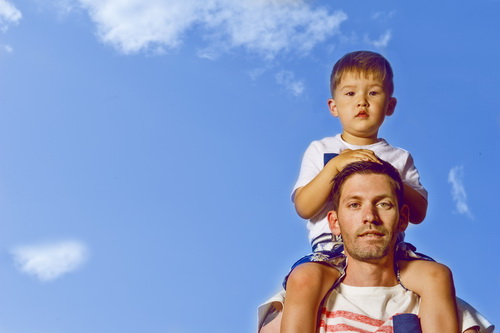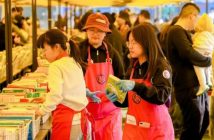As the capital of the world’s most populous country, Beijing attracts a diverse group of people to live and work. For Father’s Day this year, we interviewed four dads with interesting backgrounds and jobs about their adoptive, multicultural, and multilingual family experiences. Their answers revealed a lot about them and the love they have for their children, and what a wonderful experience being a father in Beijing can be. Part one of this two-part post features Dominic Johnson-Hill and Carl Setzer.

Dominic Johnson-Hill
British-born Dominic Johnson-Hill is the father of four girls: Prudence (age 13), Winnie (9), Rosie (7), and Betsy (4). One is adopted, one is from a previous marriage, and two are from his second marriage. Johnson-Hill is the founder of Plastered T-Shirts, along with doing TV work and a radio show. He and his wife Laura Hutchinson have both been in Beijing for over 15 years.
You have four children, including one multi-cultural child and one adopted child. Are their needs noticeably different and do they present significant challenges, one from the other?
All kids’ needs are very different, whether adopted, from a previous marriage, or biologically. In our case, it’s all these little imperfections that make us a beautifully perfect family. The girls have a great understanding of this. The cereal box family only exists on the cereal box; the mom is probably in therapy, the father is running around, and the kids are about to grow up and become … cereal box models.
We get a lot of questions from people, especially Chinese who are refreshingly direct about the make-up of our family. It is interesting to see people’s reaction when I tell them that I have four daughters from three mothers.
You’re raising all of your children in China. What’s great about Beijing as a city for children?
Children are truly cherished in China, more so than in the UK. Living in Beijing, we like to take our kids with us to restaurants. They join us often in the evenings for dinners and social occasions. We choose restaurants like Saffron where the punters are mostly Chinese. This way, no one complains about the kids being there – in fact, they love it.
In the UK, it’s really frowned upon; you would get a lot of shushing or rolling of eyes if you brought your under 12-year-olds out with you and were making some noise. Human relationships are quite complex in China, but with kids it’s very pure and sweet. It’s through our kids that we got to meet a lot of people, especially when we lived in the hutongs.
You’re quite a busy guy, between TV, radio, and Plastered T-Shirts. How do you find time for the kids in all that?
I finish work at 6pm along with everyone else at Plastered HQ. We fine staff for working overtime; it’s important to know how to close doors and enjoy life at home without stressing about work stuff. Weekends are sacred. It’s family time, and we have a place in the mountains that we run away to and turn off the phones.
Having four [kids], it’s also important to get one-on-one with the girls from time to time. All six of us live in an apartment we bought in Hepingli that is only 69sqm, so we know each other very well and we are a very strong family thanks to this.
Do the children help generate ideas for Plastered designs? Do you see things thanks to them that you might not otherwise notice?
The kids are a massive inspiration for me, as is anyone that brings me so much happiness and love. If you look at the back of our Nanluogu Xiang store, you will see a stained glass window of Deng Xiaoping; Prudence gave me this idea. We also did one of Lei Feng that now sits in the Chicago Museum of Stained Glass Windows.
The kids have taught me that immaturity should be celebrated, as immaturity and creativity are directly linked. The conundrum is that kids have the creative ideas without the skills to make them happen. We adults, as we grow, lose our creative edge but gain the skills.
What’s the best experience you’ve had so far in Beijing as a father?
Living in a shared courtyard for ten years on Nanluogu Xiang. We shared the courtyard with four families, all of whom we became very close with. We set up a small store on the street and we were a big part of its change. That was an incredible experience, being part of a community and changing the lives of many.
Kang Ayi, who still works in our store to this day eight years on, was one of those neighbors. Our kids grew up in her home – when they got back from school, they rarely came home once they walked into the courtyard. They would think [about]who was cooking what, at what time of year, then chose carefully where to eat their dinner and came home later. This is socialism with Chinese characteristics – or is it the China Dream?
Knowing what you know now, would you have done anything different?
We looked at a courtyard house on Baochao Hutong in 2004 and could have bought it for RMB 2 million. We were flat broke at the time, but that would have been a nice place for the kids to grow up – not to mention a great investment maybe worth millions of dollars now. But in terms of how we’ve raised the kids, I wouldn’t have done anything differently.
What advice would you give to other fathers in Beijing?
My wife and I always felt it was important to help our kids feel that they belong here, which can be tough. Getting involved with community is important, making an effort with neighbors so that the kids are not just international kids, but a part of the fabric of Beijing. Our kids speak fluent Chinese and that’s something that comes quite easily to most [international]kids growing up here. The hard bit is making them feel a sense of belonging and having that come through making an effort and showing respect.

Carl Setzer
Carl Setzer is the co-founder and master brewer at Great Leap Brewing, which he co-founded with his wife, Liu Fang. They have a son, 3-year-old Robby. Setzer has lived in Beijing for six years.
Tell us about raising a multicultural child in Beijing.
Raising a multicultural child in Beijing can be one of the most satisfying experiences you can imagine, and then in five minutes it can crush your spirit. The biggest pro would be the overwhelming access to some of the greatest people in one space at one time. To have those people take a real interest in your child and see how their life helps your child shape a wildly unique view of the world is great.
Would Beijing be your city of choice to raise a child, all things considered?
I think that there are two sides of this city that make you love the good side that much more. There’s blue sky Beijing and there’s “do I really need to try and get a 3-year-old to wear this mask?” Beijing. On the blue sky days, I could see Robby falling in love, getting married, and starting a family here. But since the question is “all things considered,” I do feel like there might be a child abuse charge in my future back in the US if they find out that I made him live through the AQI 900 days in 2012.
Being in the restaurant/hospitality industry, do the hours put a strain on parenting?
Robby’s sleeping habits kind of match up with mine and Liu Fang’s. The best days of the week are when we get home before he conks out. The worst are when we have to carry him to his bed and imagine what spending time with him that night would’ve showed us about his little personality. Some days I do wish that Beijingers would finally just start drinking at 9am so I can get home before dinner.
You have some extended family living with you. How much does it help – or not help – with child rearing?
My wife’s grandparents have lived with us since a year after we got married. They are as solid as they come and make our life much easier than if they weren’t with us. That being said, grandparents and great-grandparents – no matter where they are from – have one goal in life, and that is to undo everything that you are trying to teach your kid. It’s a constant struggle, because if they had their way [Robby] would already weigh 50kg and stay in diapers until he’s 13.
Was there any trepidation about starting a family in Beijing?
We weren’t planning on it, so…no? In all honesty, Beijing has been great for Robby and [my wife and I’s]marriage. The people here are great and it’s very easy to find a support group or network if you are struggling with something. I made the decision to leave my well-paying job to start Great Leap Brewing when [Liu Fang] was just hitting the second trimester. That was a stressful bit, but we had great friends to help us through.
Is there any obvious advantage to having a son here? Do you notice a difference in the way Robby is treated?
I think that Liu Fang’s grandparents really wanted a great-granddaughter, so there was no pressure to have a boy. But I would say that seeing a little guy try to figure out life in the thralls of Beijing has been very eye-opening for how I was raised and what things really are most important. But in general, I don’t think boys and girls have it any different in Beijing as long as the family wasn’t putting too much pressure on the gender outcome of their birth.
What advice would you give to other fathers in Beijing?
I’d have three points. Education: Don’t think too much about the price of international schools and tuition and the like, because if you worry about it too early on it can put you through hell. Intercultural marriages: Don’t let your mother-in-law convince your wife to sit the yuezi [a traditional post-partum period when new mothers are permitted to do very little, including bathe]and not shower for 30 days. That can ruin your marriage. Always treat your elders with respect, but show that you are leading your family by always listening to concerns but not bending to superstitions. Drinking: Take it easy on the alcohol. Trade liquor for craft beer. You’ll be much better off in the end.
This article originally appeared in the June 2014 issue of beijingkids. To find out where to get your free copy, email distribution@truerun.com or view it on Issuu.
Photos by PIXSTUDIO




